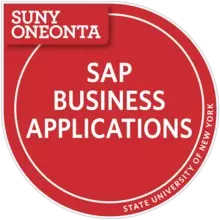Overview
SUNY Oneonta’s SAP Business Applications Microcredential is offered through the Department of Business, a member of the SAP University Alliances program. This program prepares you for the evolving demands of the global business landscape and allows you to earn the SAP Student Recognition Award (SRA), recognizing your commitment and proficiency in utilizing SAP technologies in SAP software solutions, an important skill set in the modern business landscape as a cornerstone technology in over 190 countries.
Department
Program Type
Area of Study
Delivery Mode
This certification, highlighting your expertise in SAP and ERP systems, greatly enhances your employability and appeals to a wide range of businesses and industries.
Required Courses
To obtain the microcredential, you must successfully complete a sequence of four courses. Each course in this series is designed to build upon the knowledge and skills acquired in the preceding one, ensuring a comprehensive and in-depth learning experience. This structured approach ensures that upon completion, you will have a robust understanding of the subject matter, equipping you with the necessary competencies to effectively apply your learning in real-world scenarios.
The four required courses are as follows:
- MIS 4790 - Enterprise Resource Planning (ERP)
- MGMT 3350 – Business Analytics
- MGMT 3365 - Project Management
- MGMT 3363 - Logistics Management
- MIS 4790 - Enterprise Resource Planning (ERP) - This course integrates the use of SAP S4/HANA Fiori, a cutting-edge enterprise resource planning (ERP) system. The curriculum is structured around "Introduction to ERP Using Global Bike 4.0 (Beta)," providing a comprehensive framework for understanding core business processes. The course is divided into seven distinct case studies, each tailored to explore a specific business process. The case studies are designed to offer in-depth insights and practical experience in each of these critical areas, ensuring a well-rounded understanding of the integrated nature of modern business operations. The cases employed in the class are as follows:
- Case 1: Financial Accounting – Accounts Payable (FI-AP)
- Case 2: Controlling – Cost Center Accounting (CO-CCA)
- Case 3: Materials Management (MM)
- Case 4: Sales and Distribution (SD)
- Case 5: Warehouse Management (WM) II
- Case 6: Warehouse Management (WM) III
- Case 7: Production Planning and Execution (PP)
- MGMT 3350 – Business Analytics - This course utilizes the SAP Analytics Cloud platform, a sophisticated tool for data analysis and business intelligence. Within the class framework, students are assigned course projects that are to be completed using this platform. This approach not only familiarizes students with a leading industry-standard tool but also provides practical experience in analyzing and interpreting complex data sets. The hands-on projects are designed to enhance students' analytical skills and their ability to derive meaningful insights from data, which are essential competencies in the modern business environment.
- MGMT 3365 - Project Management - In this class, SAP S4/HANA is a central component of the curriculum. A key feature of the course is the 'Project Management' case study, which is assigned as the course project. This case study provides students with a practical, real-world application of SAP S4/HANA in managing complex projects. Through this assignment, students gain hands-on experience in utilizing the system's robust capabilities for project planning, execution, monitoring, and control. This immersive approach is instrumental in equipping students with the necessary skills and understanding to effectively manage projects using modern ERP solutions in a business context.
- MGMT 3363 - Logistics Management - In this class, SAP S4/HANA is a key component of the curriculum. A pivotal aspect of the course is the 'Warehouse Management I' case study, designated as the course project. This particular case study provides students with practical experience in utilizing SAP S4/HANA for managing warehouse operations. It is designed to immerse students in the complexities of warehouse management, including inventory handling, logistics, and distribution processes. By engaging with this case study, students gain hands-on experience and develop a nuanced understanding of how advanced ERP systems can be leveraged to optimize and streamline warehouse management in a business context.
Minimum Standards
To be eligible for the SAP Recognition Award (SRA), you must adhere to specific minimum standards that are designed to demonstrate your comprehensive understanding and adept use of the SAP product suite. These standards are set to ensure that the recipients of the SRA have both a wide-ranging exposure to SAP technologies and a high level of academic achievement in this area. The qualifying criteria are as follows:
- Completion of Qualifying Courses: Students must successfully complete any three of the four courses outlined in this proposal. This requirement is crucial as it ensures that students gain a broad and varied experience with the SAP product suite, engaging with different aspects and functionalities of the software. The diversity of the courses ensures that students develop a well-rounded skill set.
- Academic Performance: Students are required to achieve a grade of B or higher, equivalent to a 3.0 on a 4.0 scale, in these three qualifying courses. This criterion highlights the importance of not only participating in the courses but also excelling in them. Achieving this grade threshold is indicative of the student’s deep understanding and competence in using SAP software. It emphasizes that the recipient of the SRA has not only engaged with the material but has also mastered it to a significant degree.
Competencies
By completing four courses with hands-on SAP content, you will gain skills in:
- technology-enabled business process integration;
- database management;
- supply chain management; and
- strategic thinking.
Upon completion, you will receive the SAP Recognition Award (SRA) as well as a notation on your transcript and a digital badge.
Eligibility
Enrolled students
1-3 semesters
12 Credits
N/A
NYS resident = $4,390
Non-resident = $9,600
How to Apply
Current students should contact the Academic Department who oversees this microcredential.

